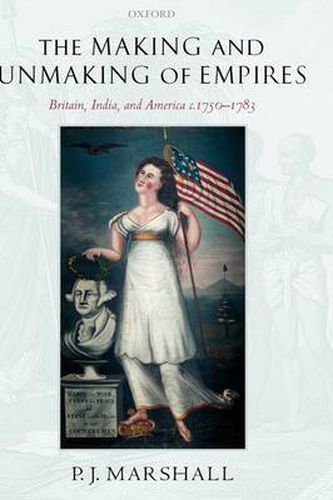Readings Newsletter
Become a Readings Member to make your shopping experience even easier.
Sign in or sign up for free!
You’re not far away from qualifying for FREE standard shipping within Australia
You’ve qualified for FREE standard shipping within Australia
The cart is loading…






In The Making and Unmaking of Empires P. J. Marshall, distinguished author of numerous books on the British Empire and former Rhodes Professor of Imperial History, provides a unified interpretation of British imperial history in the later eighteenth century. He brings together into a common focus Britain’s loss of empire in North America and the winning of territorial dominion in parts of India and argues that these developments were part of a single phase of Britain’s imperial history, rather than marking the closing of a ‘first’ Atlantic empire and the rise of a ‘second’ eastern one. In both India and North America Britain pursued similar objectives in this period. Fearful of the apparent enmity of France, Britain sought to secure the interests overseas which were thought to contribute so much to her wealth and power. This involved imposing a greater degree of control over colonies in America and over the East India Company and its new possessions in India. Aspirations to greater control also reflected an increasing confidence in Britain’s capacity to regulate the affairs of subject peoples, especially through parliament.If British objectives throughout the world were generally similar, whether they could be achieved depended on the support or at least acquiescence of those they tried to rule. Much of this book is concerned with bringing together the findings of the rich historical writing on both post-Mughal India and late colonial America to assess the strengths and weaknesses of empire in different parts of the world. In North America potential allies who were closely linked to Britain in beliefs, culture and economic interest were ultimately alienated by Britain’s political pretensions. Empire was extremely fragile in two out of the three main Indian settlements. In Bengal, however, the British achieved a modus vivendi with important groups which enabled them to build a secure base for the future subjugation of the subcontinent. With the authority of one who has made the study of empire his life’s work, Marshall provides a valuable resource for scholar and student alike.
$9.00 standard shipping within Australia
FREE standard shipping within Australia for orders over $100.00
Express & International shipping calculated at checkout
In The Making and Unmaking of Empires P. J. Marshall, distinguished author of numerous books on the British Empire and former Rhodes Professor of Imperial History, provides a unified interpretation of British imperial history in the later eighteenth century. He brings together into a common focus Britain’s loss of empire in North America and the winning of territorial dominion in parts of India and argues that these developments were part of a single phase of Britain’s imperial history, rather than marking the closing of a ‘first’ Atlantic empire and the rise of a ‘second’ eastern one. In both India and North America Britain pursued similar objectives in this period. Fearful of the apparent enmity of France, Britain sought to secure the interests overseas which were thought to contribute so much to her wealth and power. This involved imposing a greater degree of control over colonies in America and over the East India Company and its new possessions in India. Aspirations to greater control also reflected an increasing confidence in Britain’s capacity to regulate the affairs of subject peoples, especially through parliament.If British objectives throughout the world were generally similar, whether they could be achieved depended on the support or at least acquiescence of those they tried to rule. Much of this book is concerned with bringing together the findings of the rich historical writing on both post-Mughal India and late colonial America to assess the strengths and weaknesses of empire in different parts of the world. In North America potential allies who were closely linked to Britain in beliefs, culture and economic interest were ultimately alienated by Britain’s political pretensions. Empire was extremely fragile in two out of the three main Indian settlements. In Bengal, however, the British achieved a modus vivendi with important groups which enabled them to build a secure base for the future subjugation of the subcontinent. With the authority of one who has made the study of empire his life’s work, Marshall provides a valuable resource for scholar and student alike.